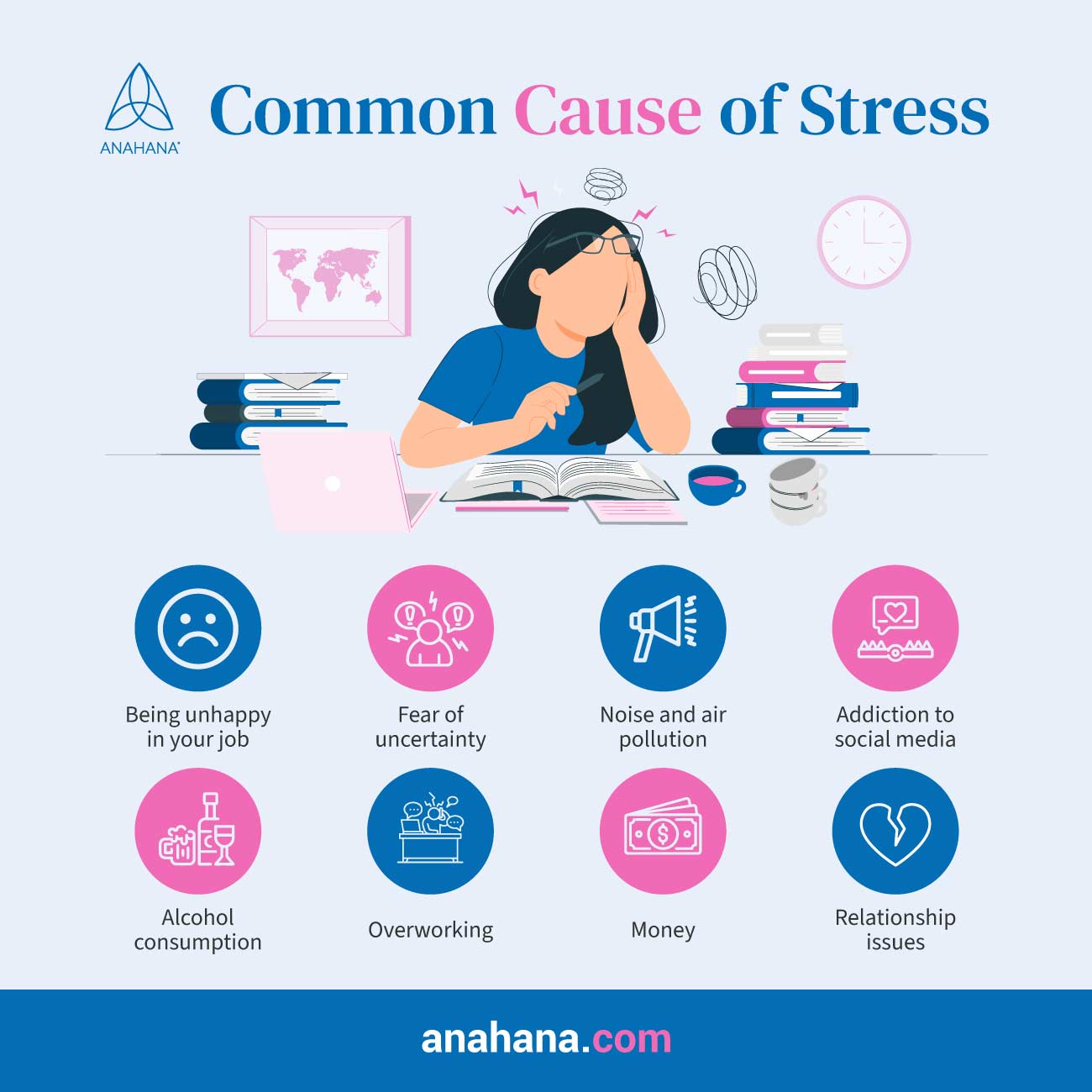
Table of Contents
Stress and pressure are two normal feelings that can occur in day-to-day life. Recognizing these, finding the source, and managing the accompanying emotions can help promote overall well-being.
Stress and Pressure Explained
Stress and pressure often feel like two sides of the same coin, representing the mental strain caused by challenging situations. The pressure from said situation is what causes you to feel this stress.
Stress and pressure may be felt due to job-related issues, financial problems, family tension, relationship problems, school deadlines and many more causes.
The immediate effects of stress are usually manageable and don’t cause much harm to your wellbeing. Small amounts of stress in the right situations can even benefit an individual.
Yet, as stress lingers, growing disproportionate and persistent, it can be harmful to both physical and mental health, leading to a range of challenges like sleep disorders, anxiety, depression, and digestive issues, among others.
What is Stress?
A lot of people may be asking themselves what stress is. It can be hard to define this concept because it looks different for everyone, and all types of stress come from various sources.
Generally, stress is a feeling or state of being in which the body and the mind feel pressure and even physical tension due to a difficult situation. This would be, for example, stress felt due to an imminent deadline at work.
There is also the normal physiological stress response; the human body releases stress hormones in dangerous situations, giving more of a physical reaction. This would include a fast heart rate, dilated pupils, increased muscle blood flow, and more.
When activated in the appropriate contexts, this physiological stress response is useful for escaping danger and helping the individual thrive.
Chronic Stress
As mentioned above, stress can be useful when felt in appropriate settings and in a proportionate way.
A physiological fight-or-flight response that releases stress hormones during a race can help individuals thrive and use more power to win.
Similarly, these physical symptoms help the body avoid danger. A small amount of stress when faced with an imminent deadline at work or school is a normal reaction and can be healthy and push you to finish the task on time.
It is, however, harmful when this type of stress is felt too often or for too long. Similarly, having a physiological stress response when there is no imminent danger or pressure harms the body and mind and may leave a person exhausted.
When someone experiences stress constantly for long periods, it can be considered chronic stress.
Chronic stress has been known to be a predisposing factor to many diseases and health problems, such as cardiac problems, anxiety, trouble sleeping, and depression. It often leads to burnout as well as many more emotional signs.
Impact on Physical and Mental Health
Mental health can quickly be affected if stress is left unattended and unrelieved. When stress turns chronic, mental and physical health are often affected negatively.
In long-term stress, the body reacts, and we can experience physical symptoms.
Symptoms may present as:
- high blood pressure
- cardiovascular disease
- poor sleep quality and duration
- sleep deprivation
- sexual problems
- digestive problems
- changes in weight (either weight gain or weight loss)
- muscle tension
- aches and pains.
Mental symptoms can often appear as anxiety, changes in mental well-being, and shifts in mood, including feelings of irritability or depression. These can lead to emotional symptoms like mental illness and declining mental health.
Suppose an individual feels that their overall well-being is affected and that stress hurts their mental health and physical health. In that case, it is important to contact the primary care provider or seek professional help to learn how to cope with and prevent stress and anxiety.
Identifying What Causes Stress

Once in a calmer, more regulated state, consider what might have caused those feelings of stress to arise.
The goal is to be able to identify the core markers for stress. That way, the “snowball effect” of stress can be stopped before it starts or at least before it gets out of hand.
In general, stress can be caused by feeling overwhelmed with responsibilities. Therefore, for many people, excess stress stems from saying “yes” to too many things.
If this is the case, it’s time to start saying “no” to more things and setting clear and healthy boundaries.
Overworking is often a recipe for disaster. Taking time for ourselves and what matters to us can help us naturally limit exposure to stressors, leading to feeling more relaxed.
In this case, stress management implementation is the best way to keep these feelings of stress and pressure at bay. Some common causes of stress in life can include:
- Job interviews
- Work-related stress
- Presentations in class
- Approaching deadlines
- Relationship problems
- Health issues
- Financial trouble
- Natural disaster
Difference Between Stress Vs. Pressure
When considering stress and pressure, distinguishing between these concepts is quite helpful.
Stress refers to an individual's psychological and physiological response to perceived challenges or demands. For instance, facing a looming deadline or navigating personal conflicts can trigger stress.
This response manifests through various symptoms such as anxiety, increased heart rate, or irritability.
Stress, in moderation, can be a motivating force, but persistent stress can have adverse health effects, including mental health concerns.
Pressure, in contrast, is often external and relates to the expectations or demands placed on an individual by their environment.
This could be work-related expectations, societal norms, or family responsibilities. Pressure acts as the external catalyst that can lead to stress.
However, the extent to which pressure translates into stress depends significantly on how one perceives and copes with these external demands. In essence, while pressure is the external force, stress is the internal reaction to that force, varying greatly from person to person.
Managing Stress
Like the unique ways people feel stressed, relieving stress can vary for each person, often falling into two main categories: some approaches can be detrimental, while others are nurturing and supportive.
Harmful Strategies
During stress, our natural stress responses can sometimes fall into repetitive patterns of fearful thoughts and actions. These cycles may inadvertently harm us or the people around us if unchecked.
Many people who experience stress take a quick and easy fix to manage stress. These offer more of a short-term, immediate relief and may include stress management activities such as:
- Excessive alcohol or substance use
- Unhealthy eating habits
- Spending money frivolously
- Engaging in other mind-altering (often risky) behaviors
- Avoidance or isolation (withdrawing from others might provide temporary relief but can intensify feelings of loneliness and isolation in the long run)
- Overworking
These are often done without much thought - almost like a reflex - to find relief from difficult feelings and emotions in stressful situations. This leads to the first way of handling stress — those instant reactions that are usually regretted right after.
Some might find themselves reaching for an extra drink, contacting an ex, vegging out in front of the television, overindulging in comfort foods, avoiding responsibilities, and skipping plans to exercise. These actions might offer momentary relief but often result in more unpleasant feelings afterward.
Beneficial Strategies
Engaging in stress-relieving activities might be challenging, even if you know they will offer long-term benefits, as they require more conscious effort and attention.
These activities are more about getting quiet, slowing down, and soothing yourself healthily. Examples include:
- Practicing yoga or doing some stretches at your desk
- Going for a run or using a punching bag
- Taking a bubble bath
- Cleaning out your desk
Understandably, many people seek short-term relief from stressful situations. However, investing in long-term practices lays a foundation for enduring resilience, profound growth, and sustainable well-being amidst life’s challenges.
Healthy Habits and Behaviors That Combat Stress
There’s no way to eradicate all stress, nor should you aim to. Not only is feeling stressed a normal part of everyday life, but it can be a good thing in small doses. Feeling stressed about a big presentation or a competition simply means being concerned about these events.
However, regular, healthy self-care behaviors can reduce the negative effects of stressful occurrences. Here are the habits that can be tried and implemented regularly:
- Meditation
- Mindfulness practice
- Yoga
- Breathwork
- Healthy eating habits
- Regular exercise
- Sleeping better
Meditation
Meditation techniques can be done alone, with a partner or group, or in a class.
Many people find that short periods of meditation can help calm the mind during stressful times or when acting impulsively because of this.
Meditation for stress, mindfulness practice, and yoga take a bit more practice than general healthy eating and regular exercise, but their effect on reducing stress levels can be life-changing:
Meditation has been practiced for thousands of years and is one of the best ways to engage the “relaxation response” and relieve symptoms of stress.
With just 10 minutes of meditation per day to reduce stress, the stress and anxiety can be decreased, concentration improved, and deep relaxation can be implemented.
Mindfulness
Mindfulness practice is something already discussed but worth mentioning again.
This practice can be used anytime, anywhere.
Individuals can even teach themselves to be mindful all the time — an idea supported by ancient Buddhism and practiced by Buddhist monks and nuns.
Mindfulness is useful to avoid rumination and a wild mind that can’t stay focused.
It helps increase the enjoyment of life by stressing the importance of the present moment.
Finally, it helps identify thoughts, feelings, and emotions that might be bothersome so that these can be fixed, attended to or accepted as part of life's up and down momentum.
Yoga
Yoga is another stress relief tool that can be practiced almost anywhere.
While one can certainly take yoga classes, it can also be done at your work desk, home on your bedroom floor, and outside on any given day.
This can promote workplace wellness by getting others to participate as well.
Yoga helps reduce stress by teaching an individual to focus on deep breathing and breathing more effectively.
Yoga poses and movements relax the body and, therefore, inherently relax the mind. This can help release emotional energy and develop a stronger connection between the body and the mind when stressed.
Frequently Asked Questions
What is the definition of stress?
Stress can be defined as a state of mental worry or tension caused by a difficult situation. Stress is a natural physiological and biological human response that helps address life's challenges and threats. No one is immune to stress; every person experiences it in some capacity.
What is the best way to relieve stress?
We deal with too much stress differently. The most recommended ways to relieve stress are by staying active and exercising regularly, meditation and mindfulness practice, expressing gratitude in a gratitude journal, doing regular check-ins with yourself, spending time outdoors and getting enough sun throughout the day, and listening to calming music.
What are the three types of stress?
The three most recognized types of stress are acute stress, which is short-term and immediate stress in response to an event; episodic acute stress, which is recurring episodes of acute stress; and chronic stress, which is long-term unrelieved stress.
No matter the type, you will feel symptoms of stress immediately if it is left unaddressed for too long.
References
Stress symptoms: Effects on your body and behavior
Stress: Signs, Symptoms, Management & Prevention
Stress | Mental Health Foundation
What is stress? | UNICEF Parenting
Disclaimer
The contents of this article are provided for informational purposes only and are not intended to substitute for professional medical advice, diagnosis, or treatment. It is always recommended to consult with a qualified healthcare provider before making any health-related changes or if you have any questions or concerns about your health. Anahana is not liable for any errors, omissions, or consequences that may occur from using the information provided.

By: Anahana
The Anahana team of researchers, writers, topic experts, and computer scientists come together worldwide to create educational and practical wellbeing articles, courses, and technology. Experienced professionals in mental and physical health, meditation, yoga, pilates, and many other fields collaborate to make complex topics easy to understand.
